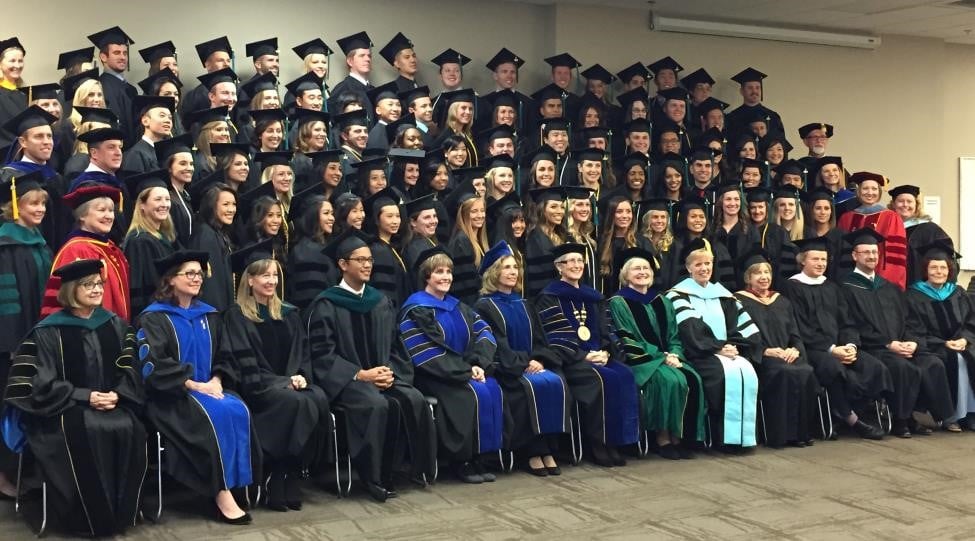
If you’re considering earning a post-graduate degree in nursing, your main choice will be between a Master of Science in Nursing (MSN) and a Doctor of Nursing Practice (DNP) program.
What is the difference between MSN and DNP programs? When deciding between a DNP or MSN path, is one better?
When considering the MSN vs DNP nurse practitioner path, note that both can lead to NP certification. They can provide a ticket to move from registered nurse to nurse executive or other advanced roles in the field. Earning a PhD is an option for those who wish to focus on research or serve as academic faculty and administrators at the highest level.
When choosing between an MSN vs. DNP, consider how each can serve your long-term career outlook and their different time and tuition investments.
What Is an MSN?
Let’s compare MSN vs. DNP educational paths with an overview of the Master of Science in Nursing (MSN) degree. An MSN prepares graduates to move into specialized nursing careers and leadership positions.
General areas of study may include:
- Evidence-based nursing practices
- Theory for advanced practice nursing
- Nursing leadership and management
- Nursing informatics
The length and focus of an MSN (vs. DNP) depends on your career outlook and educational background.
An MSN degree provides access to some of the highest levels of nursing, such as advanced practice registered nurse (APRN) roles:
- Nurse practitioner (NP)
- Family nurse practitioner (FNP)
- Psychiatric mental health nurse practitioner (PMHNP)
- Adult gerontology nurse practitioner (AGNP)*
An MSN (vs. DNP) may require as few as 36 credit hours.1,2 At the University of St. Augustine for Health Sciences (USAHS), our MSN program can also include anywhere from 225 practicum hours for a non-clinical specialty to 630 practicum hours for an advanced practice registered nurse (APRN) track.
BSN to MSN Degree Program
A Bachelor of Science in Nursing (BSN) degree is required for admission into an MSN program, where you’ll choose from various MSN tracks and options. Schools like USAHS require BSN to MSN students to complete a Bachelor’s degree in nursing (BSN) from an accredited nursing program.
RN to MSN Bridge Program
Some schools offer RN to MSN bridge programs, which allow registered nurses to apply directly to an MSN program. RN bridge students complete the foundational courses they otherwise would have taken in a BSN program.
However, curriculum choices in bridge programs may be more limited than in BSN-to-MSN tracks, with fewer electives. At USAHS, our online RN to MSN program offers two role specialty options, with credit hours ranging from 59 to 64 and practicum hours from 585 to 630, depending on the role specialty.
Accelerated or Direct-Entry MSN
No nursing degree or experience? No problem.
If you’ve completed an unrelated bachelor’s or graduate program, enter a program designed for students who have earned a general education and want to become a nurse.
Students are typically eligible to sit for the NCLEX-RN exam and apply for an RN license after their first year. Direct-entry MSN programs will often require between 50 to 120 credit hours.3

What is a Doctor of Nursing Practice (DNP)?
A Doctor of Nursing Practice (DNP) program is similar to an MSN program in several ways. With a DNP (vs. MSN) degree, if you enter with a BSN, you can select either a clinical or non-clinical track and include one or more population-specific specialties.
Like with an MSN program, you can apply to a DNP program from multiple starting points:4
- MSN degree: MSN graduates have already pursued a role specialty, so they don’t choose a specialty in the DNP path, and the program is significantly shorter.
- BSN degree: BSN-entry students choose a specialty. USAHS offers students with a BSN degree the opportunity to directly enroll in our DNP program through an online BSN to DNP program.
- RN license: An RN-to-DNP program may require BSN prerequisite coursework.
However, there is a difference between MSN and DNP education. The DNP is a higher level of practical nursing education than the MSN, with the following key requirements:
- RN requirement – DNP programs accept students with a current, unencumbered RN license—you can’t enter the program as a complete novice.4
- Additional training – Although there is overlap in APRNs and track specialties, a DNP program offers additional training than the MSN in topics such as policy, ethics, interprofessional collaboration, systems leadership and the highest levels of evidence-based practice.5
- Future APRN requirement – Currently, you can acquire APRN licensure and certification with either an MSN or DNP degree.5
Is a DNP or MSN More Prestigious?
When debating DNP vs. MSN, consider the doctorate a higher-level degree than a master’s. If you list collegiate nursing degrees in order of least to most seniority, the hierarchy is:
- Associate Degree in Nursing (ADN)
- Bachelor of Science in Nursing (BSN)
- Master of Science in Nursing (MSN)
- Doctoral degrees:
- Doctor of Nursing Practice (DNP)
- Doctor of Philosophy in Nursing (PhD in Nursing)
The two doctoral options serve different purposes: the DNP (vs. MSN) is the higher education level of nursing practice, while the PhD is focused on research and teaching at the college level.


The Benefits of DNP vs. MSN
A DNP is a degree, while a nurse practitioner (NP) is a professional role. So, consider the differences in roles and responsibilities between a nurse practitioner with a master’s vs. doctorate degree.
Essentially, a DNP (vs. MSN) prepares graduates for higher nursing leadership positions and earning potential. For example, depending on factors like the organization and geographic location, a nurse practitioner, nurse executive or family nurse practitioner’s salary would most likely be higher with a DNP (vs. MSN) degree.6
In the future, a DNP will be required for some APRN positions for which MSN degrees have been sufficient.7 Currently, Certified Registered Nurse Anesthetist (CRNA) is the primary role affected by this change.8 That means, for now, you can pursue a career as a nurse practitioner with a master’s or doctorate.

Learn More
Are you ready to move forward in your career with either an MSN or DNP to pursue a nurse practitioner specialty? Both post-graduate degree programs can expand your skills and prepare you to take on more leadership in the profession.
USAHS Nursing Programs
USAHS offers a Master of Science in Nursing (MSN), a Doctor of Nursing Practice (DNP) and Post-Graduate Nursing Certificates designed for working nurses. Our nursing degrees are offered online, with hands-on practice and specific requirements depending on the program and role specialty. The MSN has several options to accelerate your time to degree completion. Earn your advanced nursing degree while keeping your work and life in balance.
*Call for availability.
Salary data may not reflect starting pay for recent graduates.
Sources:
- Amanda Bucceri Androus, “Master’s of Science in Nursing – MSN Degree Programs,” Registered Nursing.org, July 26, 2024, https://www.registerednursing.org/degree/msn/.
- Staff Writer, “FAQ: What Are the Different Types of Master’s Degrees in Nursing?” Online FNP Programs.com, June 24, 2020, https://www.onlinefnpprograms.com/faqs/types-of-msn-degree-programs/.
- Darby Faubion, “35 Best Direct-Entry MSN Programs in the Nation – 2024,” Nursing Process.org, 2024, https://www.nursingprocess.org/direct-entry-msn-programs.html.
- Sherry Christiansen, “Doctor of Nursing Practice (DNP) Degree Overview,” NurseJournal, April 1, 2024, https://nursejournal.org/degrees/dnp.
- Chaunie Brusie, “MSN vs. DNP – Which is Better?” Nurse.org, August 6, 2024, https://nurse.org/education/msn-vs-dnp/.
- Rebecca Munday, “What Is the Average Salary with a DNP Degree,” NurseJournal, April 16, 2024, https://nursejournal.org/degrees/dnp/average-salary-with-a-dnp-degree/.
- American Association of Colleges of Nursing, “About the Doctor of Nursing Practice (DNP),” AACN, July 2023, https://www.aacnnursing.org/our-initiatives/education-practice/doctor-of-nursing-practice/about-the-dnp.
- AMN Healthcare, “Raising the Bar in CRNA Education: What the 2025 Deadline Means,” AMN Healthcare, June 23, 2023, https://www.amnhealthcare.com/blog/physician/locums/raising-the-bar-in-crna-education-what-the-2025-deadline-means/.








